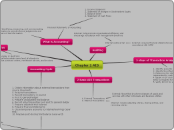Chapter 2 AIS
What is Accounting?
The process of identifying, measuring, and communicating economic information to permit informd judgements and decisions by users of the information
Financial Statements of Accounting:
1. Income Statement
2. Statement of changes in Stockholder's Equity
3. Balance Sheet
4. Statement of Cash Flows
Accounting Cycle
1. Obtain information about external transactions from source documents
2. Analyze transactions
3. Record transactions in journal
4. Post to general ledger
5. Prepare unadjusted trial balance
6. Record adjusting entries and post to general ledger
7. Prepare adjusted trial balance
8. Prepare financial statements
9. Close temporary accounts to retained earnings (year end)
10. Prepare post-closing trial balance (year-end)
How do these steps relate to the five elements of AIS?
Step 1 (input)
Steps 2-7 & 9-10 (processes)
Step 8 (output)- general purpose financial stmts
2 Basic AIS Transactions
1. External Transactions
2. Internal Transactions
External: those that involve exchanges of goods and services with other individuals and business entities
Internal: include adjusting entries, closing entries, and reversing entries
Source Documents
can be paper or electronic
their use helps retain some level of objectivity
can inclue purchase orders, remittance advices, and invoices
5 steps of Ttansaction Analysis:
1. Identify accounts affected by the transaction
2. Identify the effect of the transaction on each account
3. Determine the element of financial statements represented by each account
4. Based on Dr and Cr principles, determine which kind of entity is required for each account
5. Verify Dr=Cr for each transaction
Auditing
Internal and Exernal
Internal: help promote organizational efficiency and encourage compliance with management directives
External: ensures financial statements are prepred in accordance with GAAP
